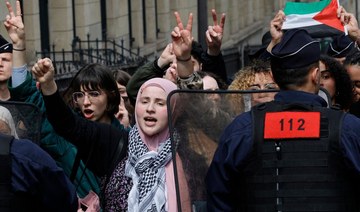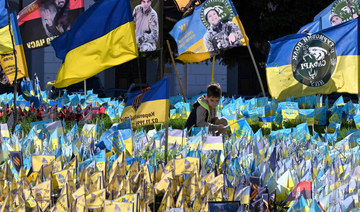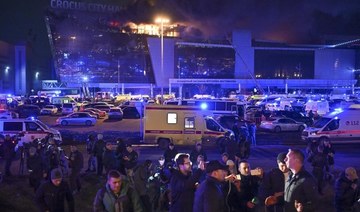PARIS: Four French police on Sunday risked being charged over the beating and racial abuse of a black music producer that shocked France and intensified controversy over new security legislation.
Tens of thousands protested across France Saturday against the security bill — which would restrict the right of the press to publish the faces of on-duty police — with the rally in Paris ending in bitter clashes.
The beating of music producer Michel Zecler — exposed in video footage published last week — has become a rallying cause for anger against the police in France, accused by critics of institutionalized racism including singling out blacks and Arabs.
The protests in Paris saw a brasserie set alight, cars set on fire and stones thrown at security forces, who responded with tear gas and anti-riot tactics.
Among those hurt was an award-winning Syrian photojournalist, Ameer Alhabi, seen with a bruised face and much of his head covered in bandages in AFP photos.
Christophe Deloire, secretary general of Reporters Without Borders, tweeted that the 24-year-old had been wounded at Place de la Bastille by “a police baton” and condemned the violence.
Alhalbi is freelance photographer who has worked for Polka Magazine and AFP, who both condemned the incident in statements Sunday.
“We are shocked by the injuries suffered by our colleague Ameer Al-Halbi and condemn the unprovoked violence,” said Phil Chetwynd, AFP’s global news director, demanding that the police investigate the incident
Police said 62 officers were injured at the demonstrations and 81 people arrested, with Interior Minister Gerald Darmanin saying the violence in the protests was “unacceptable.”
Authorities did not have a tally for the number of marchers injured, saying only that two people outside the capital had complained of police violence.
Four police have been detained over the beating of Zecler, with three of them specifically probed for using racial violence as well as for making false statements.
Following questioning by the police’s National Police Inspectorate General (IGPN) they have now been handed over to the judicial authorities to decide on the next steps, which could see them being charged.
They could face a fast-track trial or a more standard procedure which would see a case being opened and the men appear before an investigating magistrate.
Paris prosecutor Remy Heitz is due to give an update on the measures to be taken against them from 5:00 p.m. (1600 GMT).
Commentators say that the images of the beating — first published by the Loopsider news site — may never have been made public if the contentious Article 24 of the security legislation was made law.
The bill would criminalize publishing images of on-duty police with the intent of harming their “physical or psychological integrity.”
It was passed by the National Assembly although it is awaiting Senate approval.
The controversy over the law and police violence is developing into another crisis for the government as President Emmanuel Macron confronts the pandemic, its economic fallout and a host of problems on the international stage.
Macron said Friday that the images of Zecler’s beating “shame us” and asked the French government to come up with proposals to “fight against discrimination.”
For critics, the legislation is further evidence of a slide to the right by Macron, who came to power in 2017 as a centrist promising liberal reform of France.
A series of high-profile cases against police officers over mistreatment of black or Arab citizens has raised accusations of institutionalized racism. The force has insisted violations are the fault of isolated individuals.
French police risk charges over black man’s beating after clashes
https://arab.news/msch6
French police risk charges over black man’s beating after clashes
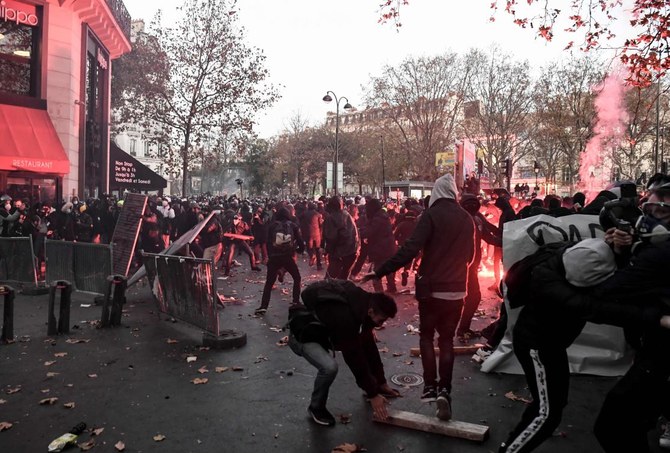
- The beating of a music producer has become a rallying cause for anger against the police in France
- The police in France are accused of institutionalized racism including singling out blacks and Arabs
Colombia to cut diplomatic ties with Israel

Petro, Colombia’s first leftist president, has also asserted that “democratic peoples cannot allow Nazism to reestablish itself in international politics“
BOGOTA: Colombian President Gustavo Petro said Wednesday his country will sever diplomatic ties with Israel, whose leader he described as “genocidal” over its war in Gaza.
“Tomorrow (Thursday) diplomatic relations with the state of Israel will be severed... for having a genocidal president,” Petro, a harsh critic of the devastating war against Hamas, told a May Day rally in Bogota.
Petro has taken a critical stance on the Gaza assault that followed an unprecedented Hamas attack on southern Israel on October 7 — which resulted in the deaths of some 1,170 people, mostly civilians, according to Israeli figures.
In October, just days after the start of the war, Israel said it was “halting security exports” to Colombia after Petro accused Israeli Defense Minister Yoav Gallant of using language about the people of Gaza similar to what the “Nazis said of the Jews.”
Petro, Colombia’s first leftist president, has also asserted that “democratic peoples cannot allow Nazism to reestablish itself in international politics.”
In February, Petro suspended Israeli weapons purchases after dozens of people died in a scramble for food aid in the war-torn Palestinian territory — an event he said “is called genocide and recalls the Holocaust.”
In the October attack, Hamas militants also took about 250 hostages, 129 of whom remain in Gaza, including 34 Israel says are presumed dead.
Israel’s retaliatory offensive has killed at least 34,568 people in Gaza, mostly women and children, according to the health ministry in the Hamas-run territory.
UK auction house removes Egyptian skulls from sale after outcry
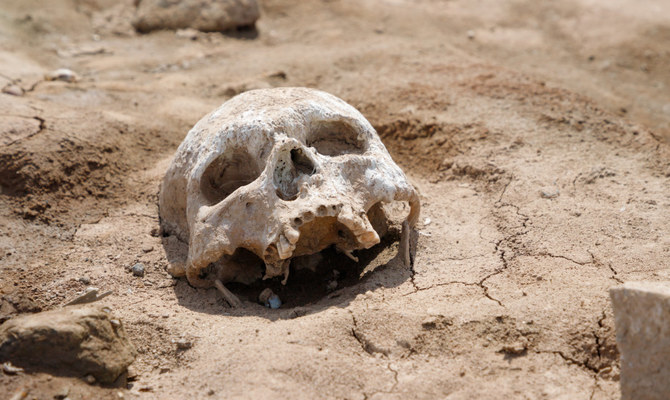
- Lawmaker condemns trade as ‘gross violation of human dignity’
- Items were part of collection owned by English archaeologist Augustus Pitt Rivers
LONDON: A UK auction house has removed 18 ancient Egyptian human skulls from sale amid condemnation by a member of Parliament, The Guardian reported.
Labour MP Bell Ribeiro-Addy said the sale of human remains for any purpose should be outlawed and described the trade as a “gross violation of human dignity.”
Semley Auctioneers in Dorset had listed the skulls with a guide price of £200-£300 ($250-$374) for each lot. The collection included 10 male skulls, five female and three of an uncertain sex.
Some of the skulls were listed as coming from Thebes and dating back to 1550 B.C.
They were originally collected by Augustus Henry Lane Fox Pitt Rivers, an English soldier and archaeologist who established the Pitt Rivers Museum in Oxford, which contains about 22,000 items.
After being housed at a separate private museum on his estate, the skulls were sold as part of a larger collection to his grandson, George Pitt Rivers, who was interned during the Second World War for supporting fascist leader Oswald Mosley.
Ribeiro-Addy said: “This despicable trade perpetuates a dark legacy of exploitation, colonialism and dehumanization. It is a gross violation of human dignity and an affront to the memory of those whose lives were unjustly taken, or whose final resting places were desecrated.
“We cannot allow profit to be made from the exploits of those who often hoped to find evidence for their racist ideology. It is imperative that we take decisive action to end such practices and ensure that the remains of those who were stolen from their homelands are respectfully repatriated.”
Britain has strict guidelines on the storage and treatment of human remains, but their sale is permitted provided they are obtained legally.
Saleroom, an online auction site, removed the skulls from sale after being contacted by The Guardian. Its website states that human remains are prohibited from sale.
A spokesperson said: “These items are legal for sale in the UK and are of archaeological and anthropological interest.
“However, after discussion with the auctioneer we have removed the items while we consider our position and wording of our policy.”
Prof. Dan Hicks, Pitt Rivers Museum’s curator of world archaeology, said: “This sale from a legacy colonial collection that was sold off in the last century shines a light on ethical standards in the art and antiquities market.
“I hope that this will inspire a new national conversation about the legality of selling human remains.”
Some of the skulls in the auction had been marked with phrenological measurements by the original collector, he said.
“The measurements of heads in order to try to define human types or racial type was something that Pitt Rivers was continuing to do with archaeological human remains in order to try to add to his interpretations of the past.”
UK students launch fresh wave of pro-Palestine protests

- Activists plan rallies and encampments on campuses across the country
- They aim to persuade universities to divest from arms companies supplying weapons to Israel
LONDON: Students in the UK are launching a fresh round of demonstrations against the war in Gaza.
The latest protests were expected to begin on Wednesday on the campuses of at least six British universities, including Sheffield, Bristol, Leeds and Newcastle, The Guardian newspaper reported. They come at a time when authorities in the US are violently cracking down on similar demonstrations.
The British students are demanding that their universities divest from arms companies that supply weapons to Israel, and in some cases that they sever all academic ties with Israeli institutions.
In Britain, regular mass public marches in London and other cities have attracted most of the attention surrounding the pro-Palestinian protest movement, with little attention so far paid to demonstrations at universities.
However, recent events in the US, including massive protests at Columbia University in New York, have encouraged student demonstrators in Britain to ramp up their efforts.
A coalition of “staff, students and alumni” at Sheffield and Sheffield Hallam universities have established an encampment in solidarity with the Palestinian people, as part of a group calling itself the Sheffield Campus Coalition for Palestine. This week, students are expected to stage walkouts from lectures and take part in a demonstration in Sheffield.
Similar activities are expected in Newcastle, organized by a group called Newcastle Apartheid off Campus. More than 40 students at the city’s university reportedly have set up an encampment on campus and planned to stage a rally on Wednesday. Organizers said students are protesting against Newcastle University’s partnership with defense firm Leonardo SpA, which produces the laser guidance system for the F-35 jets that have been used by the Israeli military in Gaza.
They added: “Although the student union has passed motions with 95 percent of people in favor of calling for the university to end its ties with Leonardo, and multiple ‘Leonardo off Campus’ protests on its campus, it is clear that the university has not listened to students’ concerns.”
Students in Leeds and Bristol are involved in similar activities, including rallies and encampments.
A spokesperson for Universities UK, which represents 142 academic institutions, said: “Universities are monitoring the latest news on campus protests in the US and Canada.
“As with any high-profile issue, universities work hard to strike the right balance between ensuring the safety of all students and staff, including preventing harassment, and supporting lawful free speech on campus. We continue to meet regularly to discuss the latest position with university leaders.”
Russians throng to display of Western ‘trophy’ tanks captured in Ukraine
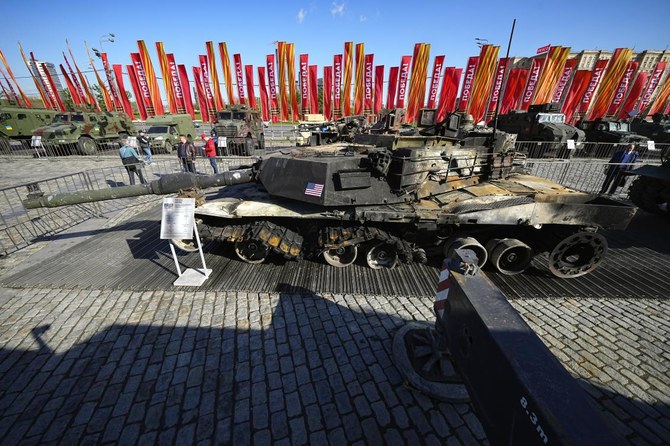
- Long queues of people formed on what was a sunny May Day public holiday at the entrance to the exhibition, entitled “Trophies of the Russian Army“
- “History is repeating itself,” the Russian Defense Ministry said in a statement
MOSCOW: Western tanks and military hardware captured by Russian forces in Ukraine went on display in Moscow on Wednesday at an exhibition the Russian military said showed Western help would not stop it winning the war.
Long queues of people formed on what was a sunny May Day public holiday at the entrance to the exhibition, entitled “Trophies of the Russian Army,” which is being held outside a museum celebrating the Soviet victory over Nazi Germany in 1945.
“History is repeating itself,” the Russian Defense Ministry said in a statement, adding that the Soviet Union had in 1943 also put on a display of captured tanks and hardware, in this case from the German army.
“Strength is in the truth. It’s always been that way. In 1943 and today. These war trophies reflect our strength. The more of them there are, the stronger we are,” the ministry stated, predicting a Russian victory in what it officially calls its “special military operation” in Ukraine.
“No Western military equipment will change the situation on the battlefield,” the statement added.
According to Western and Ukrainian critics, much of Russia’s military hardware is old or outdated, and Russian battlefield gains have resulted from sheer force of numbers and high casualties. Both sides keep the number of dead and injured a secret but are known to have suffered heavy losses.
The Moscow display, which includes US, German and French tanks supplied to Ukraine, came days after the US approved a $61 billion aid package for Kyiv and after Russia made some swift but incremental territorial gains in eastern Ukraine at a time when Kyiv’s forces say they lack ammo and manpower.
Ukraine, whose President Volodymyr Zelensky says it will eventually push Russian forces from its soil, held a similar exhibition along Kyiv’s central boulevard last summer featuring burnt-out husks of Russian tanks and fighting vehicles.
Russia, says the International Institute for Strategic Studies, has itself lost over 3,000 tanks in Ukraine amounting to its entire pre-war active inventory, but has enough lower-quality armored vehicles in storage for years of replacement and says it is now ramping up production of new tanks.
In addition to tanks, British and Australian armored vehicles seized in Ukraine are on display in Moscow along with military hardware made in Turkiye, Sweden, Austria, Finland, South Africa and the Czech Republic.
State TV’s Channel One said the star of the show was a captured American M1 Abrams battle tank, which it said had been taken out by Russian forces in eastern Ukraine using a guided rocket and kamikaze drones.
Clambering over the Abrams holding his microphone, a state TV correspondent told Russians that the tank had been billed in the United States as an indestructible “wonder weapon.”
“But that was all nonsense — look at this — all of its reputation has been destroyed,” he said.
Pet dogs and strays suffer in Asia heatwave

- Increasing number of animals suffer nosebleeds, severe skin rashes in Kolkata in heatwave
- Experts say climate change makes heatwaves more frequent, longer and more intense
Kolkata: Soaring temperatures across Kolkata have brought life in much of the Indian megacity to a standstill, but veterinarian Partha Das cannot recall a time when he was more busy.
His clinic has been swamped by distressed members of the public carrying in beloved pets suffering nosebleeds, severe skin rashes and lapses into unconsciousness in a relentless heatwave suffocating much of South and Southeastern Asia over the past week.
“Many pets are also hospitalized for three or four consecutive days, and they are taking a long time to get back to normal,” the 57-year-old told AFP from his surgery.
“We are getting several heatstroke cases in a day. It’s unprecedented.”

Kolkata has sweltered through days of punishing heat, peaking at 43 degrees Celsius for the hottest single April day since 1954, according to the city’s weather bureau.
Streets of the normally bustling colonial-era capital have been almost deserted in the afternoons as its 15 million people do what they can to stay out of the sun.
But even cats and dogs lucky enough to have an owner have been susceptible to falling ill, with Das saying the heat had triggered a surge in dehydration-related illnesses in pets from around the city.
Teacher Sriparna Bose said her two cats had become sullen and withdrawn in a way she hadn’t seen before when the heatwave hit.
“They are refusing food,” she said. “They hide in dark, cold corners of the room and won’t come out.”
The situation is worse for the 70,000 stray dogs estimated to live on city streets by municipal authorities, which have no owner but are often fed and tended to by nearby residents.
Many are spending the day taking refuge from the sun under parked cars, while a lucky few are hosed down by sympathetic humans to help them cool off.
“They are finding it difficult to stand on their soft paws because the roads are so hot,” said Gurshaan Kohli of Humanimal Foundation, a local animal welfare charity for stray animals.
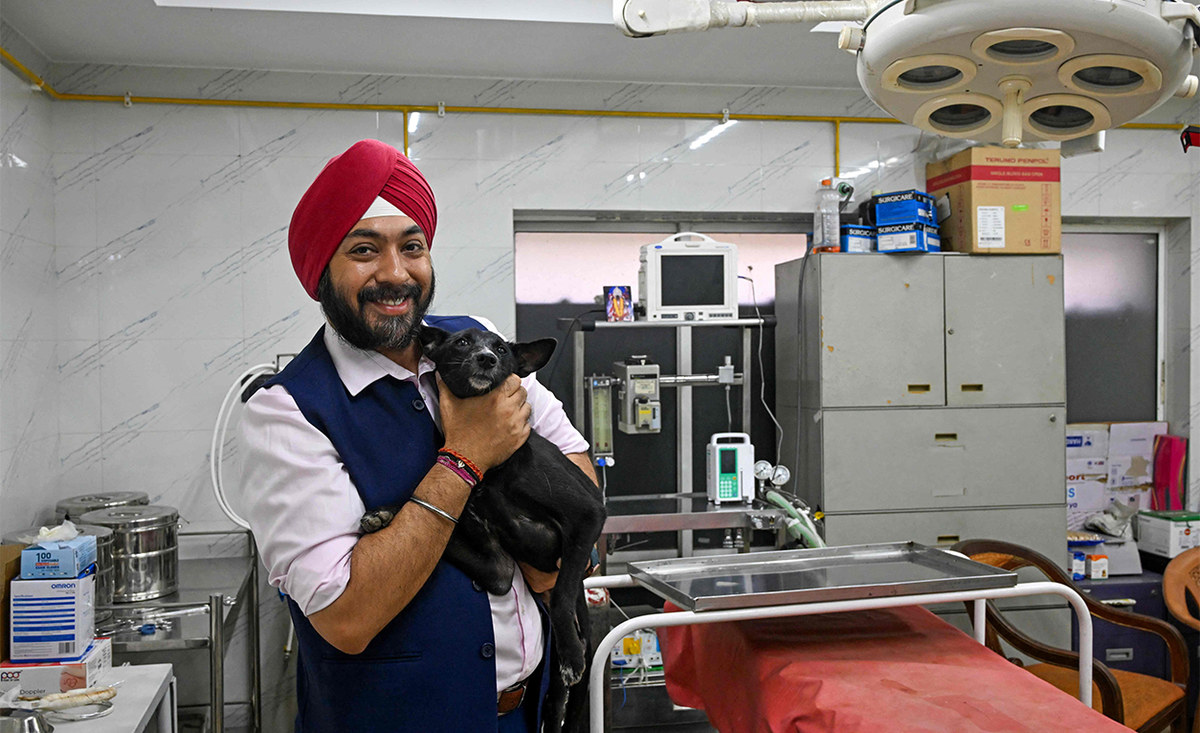
“Scores of dogs and cats have died” even though he and his colleagues had rushed them to clinics for treatment, he added.
Large swathes of South and Southeast Asia are struggling through a heatwave that has broken temperature records and forced millions of children to stay home as schools close across the region.
Experts say climate change makes heatwaves more frequent, longer and more intense, while the El Nino phenomenon is also driving this year’s exceptionally warm weather.
The heat has taken its toll on animals across the continent.
“They are eating less, and they are reluctant to move,” Henna Pekko of Rescue PAWS, which operates an animal shelter near Thailand’s capital Bangkok, told AFP.
With temperatures in Thailand exceeding 40 degrees Celsius over the past week, Pekko said her charity had taken to bringing its rescues to the ocean to cool down with a swim, while older dogs were being kept indoors.
“We are definitely taking extra precautions because of this weather,” she told AFP, adding that the stress on animals from the heat was the worst she had experienced in the kingdom.
“Last year was bad. This year was worse.”








